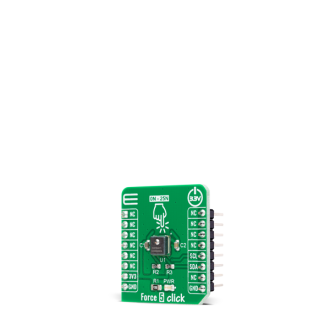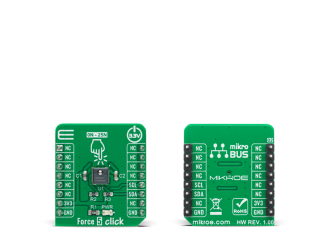
We strongly encourage users to use Package manager for sharing their code on Libstock website, because it boosts your efficiency and leaves the end user with no room for error. [more info]

Rating:
Author: MIKROE
Last Updated: 2020-10-30
Package Version: 1.0.0.0
mikroSDK Library: 1.0.0.0
Category: Force
Downloaded: 2908 times
Not followed.
License: MIT license
Force 5 Click is a compact add-on board that contains a stable and flexible compensated/amplified micro force sensor.
Do you want to subscribe in order to receive notifications regarding "Force 5 click" changes.
Do you want to unsubscribe in order to stop receiving notifications regarding "Force 5 click" changes.
Do you want to report abuse regarding "Force 5 click".


Library Description
The library covers all the necessary functions to control Force 5 Click board. Library performs a standard I2C interface communication.
Key functions:
void force5_read_all_data ( force5_data_t *force_data ) - Read all data function.float force5_get_force ( force5_calibration_t calib_data ) - Get force function.float force5_get_temperature ( void ) - Get temperature function.Examples description
The application is composed of three sections :
void application_task ( )
{
force_n = force5_get_force( calib_data );
FloatToStr( force_n, log_text );
mikrobus_logWrite( " Force : ", _LOG_TEXT );
mikrobus_logWrite( log_text, _LOG_TEXT );
mikrobus_logWrite( " N", _LOG_LINE );
mikrobus_logWrite( "-------------------------", _LOG_LINE );
Delay_ms( 500 );
}
Other mikroE Libraries used in the example:
Additional notes and informations
Depending on the development board you are using, you may need USB UART click, USB UART 2 click or RS232 click to connect to your PC, for development systems with no UART to USB interface available on the board. The terminal available in all MikroElektronika compilers, or any other terminal application of your choice, can be used to read the message.